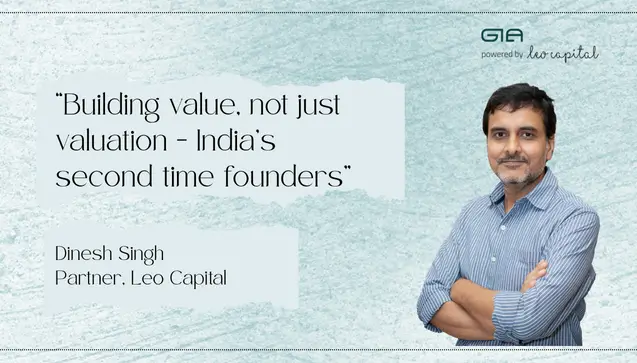The growth in the number of repeat founders is a clear indicator of the Indian startup ecosystem’s maturity. As more startups succeed and get acquired or go public, a new generation of founders is created—those who have been through the entire cycle of building, scaling, and exiting. This creates a virtuous cycle where experienced talent is recycled back into the ecosystem, not only just as founders but also as angel investors and mentors.
The “mafia” effect from successful startups is creating a new generation of seasoned entrepreneurs.
These second time founders bring a unique set of emotional and tactical strengths and learnings to their new ventures. Most important being the resilience and a positive perspective on failure combined with better understanding of the time horizon– long term view with patience. However, it’s their calculated rational approach to risk and opportunity that is making them focus on creating sustainable global companies:
Global Mindset from day one:
The venture ecosystem rewards ambition. Now it’s time to go bigger. Second-time founders have learned that the venture world rewards grander visions, so they’re skipping the small stuff. I remember talking to one repeat entrepreneur who had complete clarity on this: “I am going to bleed and it’s going to be tough anyway, so the prize better be a lot bigger.'”
Managing Growth, Profitability and Funding:
Building a venture scale company requires managing 3 things well especially in early days: growth, profitability and funding. Second time founders have much more patience and the ability to cut through the noise and focus on what’s required at different stages of companies.
In my view, one really important skill for any founder is– to choose the right battle. One at a time.
From Valuations to Value:
A key shift in the repeat founder’s mindset is a move away from simply maximizing valuation. They focus on building real value and identifying the right investors for their company. They are careful in their selection, prioritizing investors based on their geography, industry focus, and the relationship, knowing that the right partner brings much more than just capital.
Building a strong, adaptable, global team:
First-time founders sometimes put off building the right team and culture until later, but second-time founders know better. Having learned from experience, they’re deliberate about building their team from day one. In startups, most hiring is driven by inspiration, and founders need to be the chief champion of that.
It’s incredibly difficult to build a great company if you can’t inspire a much more experienced and skilled person to join your journey.
Execution Over Ideas:
First-time founders often get fixated on their revolutionary ideas, but experienced founders know it’s all about execution.
They focus on the nitty-gritty, practical aspects of building a business: distribution, sales, partnerships, hiring, and deep customer interviews. For them, getting close to customers is critical. While they’re always frugal, they never underspend on understanding their customers and how to reach them. Many first-time founders shy away from global markets initially due to the perceived cost and complexity, which often costs them years of potential growth.
Essentially, second-time founders trade the starry-eyed idealism and pressure of their first startup for the wisdom and experience they’ve earned.
They’re not just building bigger; they’re building smarter and with a vision that goes way beyond India.
They’ve learned that in the venture world, you are constrained only by your imagination.

